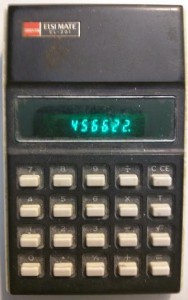The Sharp calculator to the left is an electronic antique in all senses of the word. This Elsimate EL-201 is 39 years old—my late father originally used it. I still rely on the Sharp from time to time, such as when working on taxes.
And now two related questions:
1. What “legacy” electronics do you yourself actually use, not just preserve? Use for what? Smartphones, such as the Nexus 6 with which I snapped the photo, could be useless as phones 39 years hence due to carriers’ changing technical standards. But maybe they’ll still work as computers and cameras, at least with software that needn’t check in with a certain site.
2. Just what electronic devices do you expect to pass on for your children, grandchildren, nieces or nephews to actually be able to use?
Given some major e-book vendors’ current reliance on proprietary formats—as well as use of proprietary DRM when publishers want it—what does this mean in terms of generation-to-generation pass-ons of books? Never mind the single-user license model.
To what extent, 40-50 years from now, could your now-brand-new Kindle be functional, assuming the battery’s still good?
I suspect that old Kindles and Nooks and Kobos will work just fine with non-encrypted files and perhaps even with DRMed ones, as long as there’s no requirement to phone home to the mother ship.
Will the oldies be able to read future formats, though? My hunch is that they will be capable of displaying ePub books if the International Digital Publishing Forum bakes in enough backwards compatibility. However much an ePub booster, I won’t count on it for certain. Still, e-book standards should at least make it easier to come up with conversion software.
No, I won’t even get into the cultural ramifications here, including the fact that permanence or at least longevity—in various ways—has traditionally has been among the salient traits of “quality” books. As we know, however, DRM isn’t exactly that best way to facilitate the transmission of culture and knowledge from generation to generation.
After almost forty years, AA batteries are around for dad’s calculator. Wouldn’t it be terrific if e-books and related gizmos would hold up just as well?

































My main legacy electronic device that I can identify is a little surprising: a first-generation iPad. (The self-same one that TeleRead itself sent me so many years ago, in fact.) I keep it around for one very specific use. Can you guess what?
I won’t attempt to include spoiler space in a comment, because it would look silly, so you may consider that question rhetorical if you like. I keep it around for such times as I might need to keep track of where one or the other of my brothers are, such as if they’re planning to come over for a visit. They’re both still Apple users and registered on Apple’s “Find My Friends,” which still works and is still installed on the tablet, so I can open it up and see exactly where they are at any given moment.
I just checked it right now, and yep, there they are.
Funny thing, but there doesn’t seem to be an equivalent register-to-share-your-location-at-all-times app on Android. I’ve looked. The closest thing seems to be a send-your-location-for-a-couple-of-hours app, Glympse. I guess that’s one area where Apple still has Android beat. (Or, if you feel like that kind of location-sharing would be an imposition on your privacy, vice versa.)
Until a few months ago, I also used the iPad with a white noise app for getting to sleep, but I haven’t messed with that since I stopped using wired earbuds and switched to the Plantronics.
Just fiddled around with it a little more, and if you can believe it, it still has a few apps that want to update themselves, so I’m letting it. But trying to install any new apps from the iTunes Store is pretty much a no-go. Google Hangouts requires a minimum of iOS 7, so that’s a nope. (Why do they even let me see the app if it’s just going to stick its tongue out at me when I try to install it?)
I still have my first-generation iPod Touch around somewhere, too, though I don’t know where. Maybe it’ll turn up next time I clean my apartment.
I still use my Hewlett Packard 17B II Business calculator and my Miida 12PD desktop calculator. I have a standard rotary desk phone occasionally used. I still use my Hewlett Packard LaserJet 6L. So some of the older stuff still does precisely what we expect it to with no need to change for change’s sake.
I expect that DRM (Damnable Restrictions Management) will go away since I know that the first thing many people do is de-DRM it. My Sony eReader still works fine keeping recipes and some books. Expect the old formats to have conversion tools like Calibre that will keep up with the new hardware.
Are game consoles in the running? If so, I still have—and use—the original Nintendo with my favorite games. 😀
@MrsMac: Game consoles certainly do count! So, beyond saving money, why have you stuck with the original Nintendo?
my radio. circa 1988.